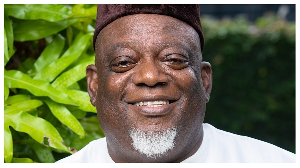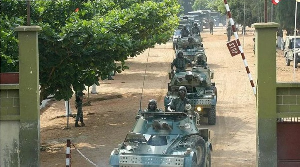A number of women said to have been deprived of their livelihoods through an alleged indiscriminate felling of economic trees by the Shaanxi Mining Company Ltd at Gbani, a community in the Talensi District, have been sensitised to issues concerning their rights.
A sensitisation session took place Saturday in the community where the President of the National Patriots against Injustice and Corruption (NAPAIC) and former Assemblyman for the Gaare-Gbani Electoral Area, Bismark Zumah, addressed the women.
Some men, who claimed they lost their means of support after the Chinese mining company arrived in the district in 2008, also participated in the meeting. The ‘demand-your-rights’ campaign, sponsored by Global Greengrants Fund (GGF), is scheduled to run from July to October, 2020.
“Since the Shaanxi Mining Company came into this area, they have infringed on the rights of members of the community. They need to know their rights and how to fight for their rights. They should not just sit down and allow the violation of their rights to pass without redress through the appropriate quarters. Everybody is aware that this company came and destroyed shea trees which were the source of livelihoods for the community members.
“The company did not compensate the community members and did not replace the trees it destroyed. The women used to pick the shea fruits for commercial processing; but now they have no access to that. All the farmlands belonging to the community members have been taken over by the activities of the company, yet nothing is being given to them; there is no any alternative livelihood support for them. They need to come together, voice out and demand from the company what is due them,” Mr Zumah told the press moments after he had given a talk to the participants in the locally spoken Talen.
The campaign is scheduled to last from July to October, 2020. The experienced human rights advocate added: “The company has cut down a lot of trees. There are some trees that are not shea-nut trees. They are medicinal trees which are used in preparing herbs for treatment of some ailments in the community. The company has destroyed a lot of them, yet they have not replaced those trees. If a company comes to their area to do mining, they should first of all ask whether the company has been given permit by the Forestry Department to cut down trees. It was because the company knew the community members could not talk it did this to them even without compensation or giving them alternative livelihoods after destroying the shea trees they used to depend on. No woman was given a penny.”
Community members share stories of struggles
To avoid breaching the coronavirus (COVID-19) safety protocols, the open-air session was held in sections with protective masks shared among the participants to cover their mouths and noses. And when the event ended, some of the community members told the media how lives had been without livelihoods in that neighbourhood.
“The company came and destroyed our farmlands,” stated John Sakyn in the native Talen. “We cannot farm again where we used to farm because they have invaded the whole place. That is where they are doing their mining. We are struggling to survive. If we can get support from any compassionate person or organisation, we will appreciate it. We can’t live in a land of gold and live in poverty at the same time.”
Kutiiba Belimyin, a mother of four children, spoke with grief: “I would be a liar if I described the circumstance in which we find ourselves here as up to scratch. Even what to eat is hard for us. The shea nut was what we used to pick and process to take care of our children. The company came and destroyed everything. That is why we are struggling here.”
A young man, who mentioned his name as Prosper Keli-Onni and said he was jobless, blamed the company for “taking my father’s farmland” and begged charitable organisations to come to his aid with an alternative livelihood “because we are struggling here to live”.
“We used to farm, but now they have blocked our way. Mothers and wives in this community used to go to farms and pick shea nuts. We would be happy if we could get help from anybody who can come in to change our situation. The Chinese who are from far away are those who are benefiting whilst we the members of the community are suffering. We need training so we can have something to do to take care of ourselves,” grieved another mother, Kpelimdolba Ziyaabil.
Their claims are false— Shaanxi
But the company is contesting the claims that it felled trees without replacing them and took over farmlands without compensating the owners.
“Our company is an underground mine. We do not cut down trees. Our operations do not endanger trees. The economic trees that our work seemed to affect, or affected, were calculated and paid [for]. You know we transported electricity from Bolga to our site and, so, in the process the trees that were going to be affected were paid [for] by the contractor who was given the contract to work on the line and they were paid for to the district Forestry Commission office in Bolga. The district Forestry Commission officers can respond to this. So, the claim that our operations have led to loss of shea-nut trees is not true.
“Somewhere 24th July 2014, there was a public hearing about land that Shaanxi was going to acquire for its office and machinery setups. All those farmers who were farming on this particular land were duly compensated. There is evidence to the fact that they all took the money for compensation. In fact, there was a committee that was set up to work on this compensation programme and it was headed by the Chief of Baare, [Naab] Nyakora Mantil. The company compensated all the farmers who were here. They were farmers from Gbani, Sheaga, Namoalogo. And so it is surprising that these farmers would come again that they have lost their farmlands to Shaanxi operations,” said the company’s Assistant Public Relations Officer (PRO), Ebenezer Bognaab.
The Assistant PRO stated further: “If they say they were not compensated, I’m wondering where they were for the past six years since 2014. I’m tempted to believe that it is some of the farmers who actually took part in this compensation, probably have finished using the money or did not use the money very well and now think that they should say they have not been compensated. As I speak to you, in our offices here you see shea-nut trees. Yesterday, I met about two women going out of our security gates with a lot of shea nuts. We have planted trees to replace trees that Shaanxi has felled before.”
Starr News will engage the two sides further on their opposing claims and keep the public informed in subsequent news reports on the matter.
Regional News of Tuesday, 7 July 2020
Source: dailymailgh.com

















